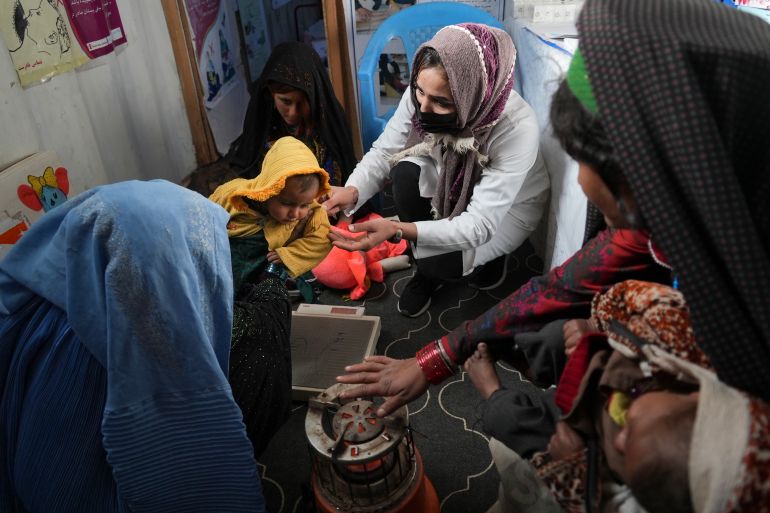US watchdog ‘cannot assure’ Afghanistan aid not going to Taliban
Special inspector says oversight has been hindered by State Department’s ‘persistent refusal’ to provide information.

The head of the Special Inspector General for Afghanistan Reconstruction (SIGAR) has decried a lack of transparency from United States agencies that he said has made it impossible to determine if aid allocated to the people of Afghanistan is instead “currently funding the Taliban”.
During a fiery testimony on Wednesday to the US House Oversight Committee, Special Inspector John Sopko accused the State Department and other agencies of failing to provide legally mandated information that would allow the watchdog to perform its oversight duties.
Keep reading
list of 3 itemsAfghanistan school year starts without millions of teenage girls
Taliban kills 6 ISIL fighters in overnight raid in Balkh province
SIGAR is charged with overseeing about $8bn that the US has “provided or otherwise made available” to the Afghan people.
Those funds, US officials have said, are meant to circumvent the Taliban, which Washington still considers a “terrorist organisation”. The Taliban seized power in Afghanistan weeks before the US completed a full troop withdrawal in August 2021.
“I cannot report to this Committee or the American people on the extent to which our government may be funding the Taliban and other nefarious groups with US taxpayer dollars,” Sopko said in a prepared opening statement.
“We simply do not know since the Department of State, USAID, the UN and other agencies are refusing to give us basic information that we or any other oversight body would need to ensure safe stewardship of tax dollars.”
He further accused the State Department of “obfuscation and delay”, calling the lack of cooperation “unprecedented” in his 12 years in the role.
White House spokesperson Karine Jean-Pierre pushed back on the claims.
The administration of President Joe Biden has “consistently provided updates and information” about the spending, she said.
That includes “thousands of pages of documents, analysis, spreadsheets and written responses to questions”, as well as congressional testimony and “hundreds of briefings to bipartisan members and also their staff”, Jean-Pierre explained.
The hearing comes a day after Ramiz Alakbarov, the United Nations Deputy Special Representative and Humanitarian Coordinator for Afghanistan, said the country “remains the world’s largest humanitarian crisis in 2023”, with 28 million people now depending on aid to survive.
He added the country’s gross domestic product (GDP) declined by up to 35 percent in the last 18 months, with the cost of a basic food basket increasing by 30 percent and unemployment by 40 percent.
UN chief António Guterres has said he will convene a meeting of special envoys to Afghanistan on May 1 and 2 in Doha, Qatar, which is meant to “reinvigorate international engagement” on Afghanistan.
UN officials have also suggested the meeting could include “baby steps” towards the international community formally recognising the Taliban, albeit with conditions attached.
US aid to Afghanistan included $3.5bn transferred from otherwise frozen Afghan central banks funds to an international fund aimed at stabilising the country’s economy, Sopko said.
He also noted $2bn in humanitarian and development aid and another $2.8bn from the Department of Defense to support the transport, housing and food needs of Afghan allies evacuated from the country.
He added it was “clear” from the SIGAR’s work that the Taliban were benefitting from the aid, including by imposing customs and vendor charges on aid shipments coming into the country.
Sopko also accused the Taliban of diverting funds away from groups it “considers hostile”, such as the Hazaras ethnic minority, “and toward groups they favour”.
Those findings were detailed in the latest SIGAR report also released on Wednesday.
Later in the hearing, Sopko added: “I haven’t seen a starving Taliban fighter on TV. They all seem to be fat, dumb and happy. I see a lot of starving Afghan children on TV. So I’m wondering where all this funding is going.”
Still, he stressed, the full benefits the Taliban were taking from foreign aid remain unknown.
“When SIGAR asked State how much revenue the Taliban is collecting from the UN, NGOs or other groups delivering international aid, shockingly State’s response was that it didn’t know,” he said.
“Similarly, the UN does not provide State or SIGAR detailed accounts of its expenditures, nor that of its partners. We believe this lack of information makes it impossible to make informed decisions about programme effectiveness.”
The watchdog’s latest report also painted a grim picture of the status of pledges to relocate the tens of thousands of Afghans who worked with the US during its two-decade occupation of the country.
The latest figures show 175,000 Afghans are waiting for the US government to process their Special Immigration Visa (SIV) or US refugee applications. With only about 20 percent of SIV applications already processed, the watchdog noted it could take decades to complete the relocation.
“According to one estimate, at the current pace, it will take 31 years to relocate and resettle all SIV applicants,” the report said.
“The US government’s failure to create a database of eligible Afghans has created almost insurmountable burdens on applicants to obtain evidence of their service, requiring they track down their supervisors from years before to obtain referral and human resource letters from now-defunct companies,” the report added.
On April 7, the Biden administration released a summary report of the Afghanistan withdrawal, in which the administration defended its decision to pull out of the country.
The agencies involved in the pullout largely placed the blame for its chaotic execution on decisions made by the administration of former President Donald Trump, including an overall lack of planning.
“Indeed, there were no such plans in place when President Biden came into office, even with the agreed upon full withdrawal just over three months away,” the summary report said.